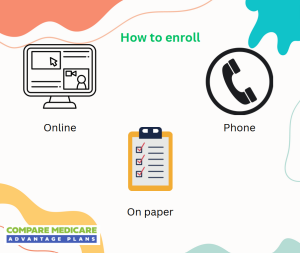Medicare Advantage RX Plans
If you’re sorting through the potential Medicare options, understanding Medicare Advantage RX Plans might be key. These plans could bundle hospital, medical, and prescription drug coverage, potentially offering a streamlined healthcare solution.
This article provides a straightforward comparison to other plans and advice on picking the best Medicare Advantage RX Plan for 2025 for your medication needs.
Key Takeaways
- Some of the Medicare Advantage RX Plans, known as MA-PD, may combine Medicare Parts A, B, and D into a holistic plan that may offer additional benefits, potentially catering to both healthcare and prescription drug needs for individuals who are primarily 65 or older.
- Choosing the right Medicare Advantage RX Plan will likely involve assessing individual prescription drug needs, comparing plans’ potential costs and benefits, and evaluating network providers and pharmacies to ensure cost-effective and convenient access to care.
- Managing prescription drug costs will likely be crucial and could be aided by strategies such as using generic drugs, using mail-order pharmacies, and seeking financial assistance through Medicare subsidies and the Extra Help program.
Compare Plans in One Step!
Enter Zip Code
Understanding the Potential Medicare Advantage RX Plans

When it comes to comprehending the possible Medicare Advantage RX Plans, starting with the fundamentals is key. Some plans, also known as Medicare Part C, could integrate Medicare Parts A, B, and D into a unified plan that might be provided by a private insurance company, possibly encompassing Medicare drug coverage.
Eligible beneficiaries could potentially, have access to a wide array of prescription drugs, which may include most drugs in protected classes used for treating ailments like cancer, and HIV/AIDS.
What is a Medicare Advantage RX Plan?
A Medicare Advantage RX Plan, also referred to as MA-PD, might encompass coverage for inpatient and hospital services (Part A), outpatient and medical services (Part B), and might offer drug coverage (Part D).
Some of these Medicare health plan options may incorporate Part D for prescription drug benefits, possibly offering a holistic healthcare solution.
The majority of individuals aged 65 or above, who are U.S. citizens or legal permanent residents for five consecutive years, are eligible for a Medicare Advantage RX Plan.
Comparing Medicare Advantage RX Plans to Standalone PDPs
Some of the Medicare Advantage RX Plans may provide different coverage options when compared to Standalone Prescription Drug Plans (PDPs) and separate Medicare drug plan options.
While MA-PDs might integrate hospital, medical, and prescription drug coverage into a single plan, some of the PDPs may exclusively cover prescription drugs, which might make them a distinct type of prescription drug plan.
The possibility of having integrated Medicare prescription drug coverage, also known as creditable prescription drug coverage, will likely facilitate the coordination of care and management of potential costs for both prescription drugs and other Medicare benefits and could offer a comprehensive healthcare solution compared to standalone PDPs.
Possible Benefits of Integrated Prescription Drug Coverage
Integrated Medicare Part D coverage in certain Medicare Advantage RX Plans might improve care coordination by ensuring beneficiaries could receive comprehensive care management, which may include both their medical needs and prescription drug coverage.
Some of the Medicare Advantage RX Plans may offer enhanced convenience with the potential provision of lower premiums and deductibles for drug coverage, thus streamlining the user’s healthcare experience by potentially integrating various services.
Choosing the Right Medicare Advantage RX Plan

Selection of an appropriate Medicare Advantage RX Plan likely requires a mindful evaluation of your prescription drug requirements, comparison of the potential costs and benefits among various Medicare Advantage plans, and scrutinizing network providers and pharmacies.
Assessing Your Prescription Drug Needs
When assessing your Medicare prescription drug requirements for a Medicare Advantage RX Plan, you might want to consider these factors:
- Ensure that the drug plans include your prescription drugs on their formulary
- Review your covered drugs list
- Estimate your drug costs
- Compare Medicare drug plans.
Comprehending the stability of your health condition and its potential impact on prescription drug needs could also play a vital role in making well-informed decisions about your healthcare coverage.
Evaluating Network Providers and Pharmacies
Evaluating network providers, including preferred provider organization options, and pharmacies could be vital, as it might ensure the choice of a plan that could provide in-network access to preferred pharmacies, which could secure accessibility and cost-effectiveness of prescription drug coverage.
All network pharmacies, particularly those with preferred cost-sharing, will likely play a significant role in managing patient cost-sharing and overall healthcare expenses while also improving health outcomes.
How Medicare Subsidies Might Affect RX Plans

Medicare subsidies could significantly contribute to making healthcare affordable for numerous beneficiaries. By subsidizing the remaining cost based on bids submitted by plans for their anticipated benefit payments.
Some subsidies may assist in covering:
- Medicare premiums
- Deductibles
- Coinsurance
- Copayments
for eligible individuals.
Types of Medicare Subsidies
Medicare may offer subsidies such as the Part D Low Income Subsidy (LIS), also known as Extra Help, that could aid individuals with limited incomes and resources.
This assistance could help reduce certain prescription drug costs for beneficiaries with low income, modest assets, and may be obtained through Medicare-approved private plans.
Eligibility for Subsidies
Specific income and resource limits will likely determine eligibility for Medicare subsidies. Enrollment in Medicare Savings Programs may automatically entitle Medicare beneficiaries to receive assistance through the Part D Low-Income Subsidy.
Possible Impacts on Plan Costs
Some of the subsidies for certain Medicare Advantage RX Plans might contribute toward reducing premiums, deductibles, and copayments. These subsidies, such as the low-income subsidy, could have a substantial impact on potentially reducing prescription drug costs by decreasing certain out-of-pocket expenses for eligible beneficiaries.
Managing Your Prescription Drug Costs with Medicare Advantage

Effectively managing your prescription drug costs could be vital for maintaining your financial health. Strategies like utilizing generic medications, exploring mail-order pharmacy options, and taking advantage of extra help programs may lower some of your out-of-pocket costs.
Utilizing Generic Medications
Choosing generic medications might offer several benefits, such as lowered expenses and efficacy comparable to brand-name drugs. It’s important to note that generic medications could be as effective as brand-name drugs.
Taking Advantage of Extra Help Programs
The Extra Help program for Medicare Advantage RX Plan could aid individuals with limited income and resources by potentially reducing or eliminating Part D costs. The program may support prescription drug expenses, including coverage for both generic and brand-name drugs.
To qualify for the Extra Help program for certain Medicare Advantage RX Plans, individuals must satisfy specific income and resource limits.
Navigating the Enrollment Process
Grasping the enrollment process for Medicare Advantage RX Plans can facilitate a smoother and less stressful transition. This includes knowing when to enroll, how to enroll, and how to switch plans during open enrollment.
When to Enroll in a Medicare Advantage RX Plan
The standard duration of the initial enrollment period for a Medicare Advantage RX Plan spans 7 months, starting 3 months before the month of turning 65, including the month of turning 65, and ending 3 months post the month of turning 65.
In addition to the initial enrollment period, individuals can also transition from Original Medicare to a Medicare Advantage RX Plan during the annual open enrollment period, which spans from October 15 through December 7.
How to Enroll: Online, Phone, or Paper Form
There are three methods available for enrolling in a Medicare Advantage RX Plan:
 Online: Individuals can enter their zip code on this website to compare plans and enroll.
Online: Individuals can enter their zip code on this website to compare plans and enroll.
- Over the phone: Enrollment can be accomplished by calling one of our licensed agents today at 1-833-641-4938.
- Using a paper form: Individuals can complete a paper enrollment form and mail it to the plan.
Switching Plans During Open Enrollment
The Medicare Advantage Open Enrollment Period, running from January 1 through March 31 each year, gives individuals the chance to switch from their current Medicare Advantage Plan to a different one.
The procedure for changing Medicare Advantage RX plans during open enrollment is easy, just call us today at 1-833-641-4938 to enroll in the new plan and be automatically disenrolled from the previous one when the new coverage starts.
Summary
Navigating the world of Medicare Advantage RX Plans might not be a daunting task. With a clear understanding of the plans, the subsidies that may be available, and the various methods to manage your prescription drug costs, you can make an informed decision that best suits your healthcare needs and budget.
Frequently Asked Questions
→ Which Medicare Advantage plan could include prescription drug coverage?
All Special Needs Plans (SNPs) are required to include Medicare prescription drug coverage. This could potentially ensure that all members may have access to necessary medications.
→ What is the biggest advantage of Medicare Advantage?
One of the biggest advantages of Medicare Advantage might be their broad range of choices for doctors and medical offices compared to Original Medicare, along with potentially reduced overall costs for complex medical needs.
→ Can you use GoodRx if you have Medicare Advantage?
Yes, Medicare Advantage beneficiaries may be able to use GoodRx to compare prescription drug costs and utilize GoodRx discounts if the cost is lower than their Medicare copay.
GoodRx cannot be used in conjunction with Medicare or other federal or state-funded programs such as Medicaid.
→ Why are people choosing Medicare Advantage plans?
Many people might choose the Medicare Advantage plans due to the lack of prior authorization and quick payments from insurers.
→ How can I assess my prescription drug needs?
To assess your prescription drug needs, you should verify that your drugs are included in the drug plans’ formulary, review your covered drugs list, estimate your drug costs, and compare Medicare drug plans for the best fit.

ZRN Health & Financial Services, LLC, a Texas limited liability company
Russell Noga is the CEO of ZRN Health & Financial Services, and head content editor of several Medicare insurance online publications. He has over 15 years of experience as a licensed Medicare insurance broker helping Medicare beneficiaries learn about Medicare, Medicare Advantage Plans, Medigap insurance, and Medicare Part D prescription drug plans.



 Online: Individuals can enter their zip code on this website to compare plans and enroll.
Online: Individuals can enter their zip code on this website to compare plans and enroll.